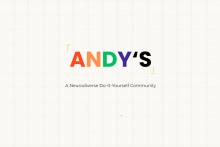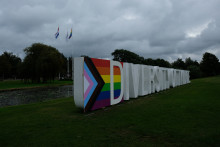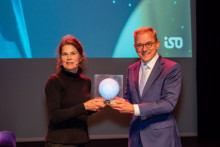What is the ANDY community and why was it set up?
‘The UT has an Incentive Fund, aimed at promoting diversity, equity and inclusion at the university. That’s where Jelle van Dijk stepped in. He thought to make use of this fund, with the goal of starting a community for neurodiverse people at the UT. The intentions for the community were to have members connect with each other, and to neurodiversity-related resources. Members can share experiences, tips, tricks and solutions with each other. Jelle received the fund, thus he started looking for a student who could be a connecting point for the community. That’s where I came in. When I stumbled on the vacancy, it really struck a chord. I’m a neurodiverse student myself and was very excited to contribute to this project and make an impact for the neurodiverse UT-community.’
How is this community set up?
‘In its essence, it’s a platform that is built by neurodiverse students for neurodiverse students. So the great part is that it’s a bottom-up initiative. With a group of eight neurodiverse people – students, former students and PhD’s – we started off with a clean slate and held multiple co-designing sessions. In the end we set up a Discord server, with three goals and categories: to discuss, create and share.’
What defines a person with neurodiversity?
‘You of course have the very clinical definition: the term is generally used in the context of autism spectrum disorders, or other neurological or developmental conditions like ADD/ADHD or a learning disorder like dyslexia. The thing is, neurodiversity means something different for everyone. I’d like to quote one of our members, who sums it up really well: “Before my diagnosis I felt faulty, broken, and not good enough compared to others. When I finally got a name for my flavour of neurodiversity and how it affected me, I brought context to literally my entire life, and taught me to be more forgiving of myself. You wouldn't blame someone with a broken leg for not being able to run a marathon, would you? These days however, I see neurodivergence more as variety of different minds that don't fit in our society. I no longer think I am broken, society is just not built for people like me”.’
And what is it like for you, also with regards to studying here?
‘There are definitely more struggles than benefits to it. The upside is that you see certain parts of the world differently than a neurotypical person. Creative Technology was the perfect study for me in that regard. Yet the struggles and challenges outweigh the benefits in this society. The structure of higher education is not catered to neurodiverse students at the moment; it's very fast-paced, students are expected to conform to tight schedules, and we are expected to be able to concentrate eight hours consecutively. This is simply not the type of environment that neurodiverse students can thrive in. In the end, it took me four years to complete my bachelor’s. After about a year of studying I was diagnosed with ADD and dyslexia, and I had to take a year off because of depression and anxiety. During that year I had the opportunity to work at the DesignLab as project manager, it was then that I realised that I learn better in a working environment, so I won’t be doing a Master’s.’
What makes this a do-it-yourself community?
‘The aspect of helping each other, that should lower a lot of thresholds. For instance, we share with each other where to find appropriate resources at the UT, for instance at Student Services. We also share recommendations for YouTube videos or podcasts that might be of help to someone. And we share DIY solutions with each other in a forum-like place like Reddit. For instance, one of the questions someone asked is: how do I keep my desk tidy? Others then respond with tips for labelling the desk and arranging it per category. Someone else even recommended specific IKEA furniture. Especially when you’re stuck in some kind of loop, it really helps if someone who’s been through something similar gives advice.’
Is this a secluded or even exclusive kind of community?
‘No, you definitely do not need an "official" diagnosis to become a part of it. We are open to anyone, both students, academic staff and support staff at the UT. Some people might recognise some aspects of neurodiversity among themselves, without having a diagnosis, and want to connect with others about it. For a lot of people, getting a diagnosis is a scary and very lengthy process, and we are very much aware of that. So, we want to make sure the community is open to those who feel like they belong in it.’
Where do you hope this initiative will develop into in the future?
‘We just started off and we’re with a small group for now with primarily students. But let’s see where it goes. We recently had a talk with HR representatives who mentioned that a group of employees is in the same boat, so this could also become a very mixed group of both students and employees. Let’s see how many more people will join and how active it is.’







